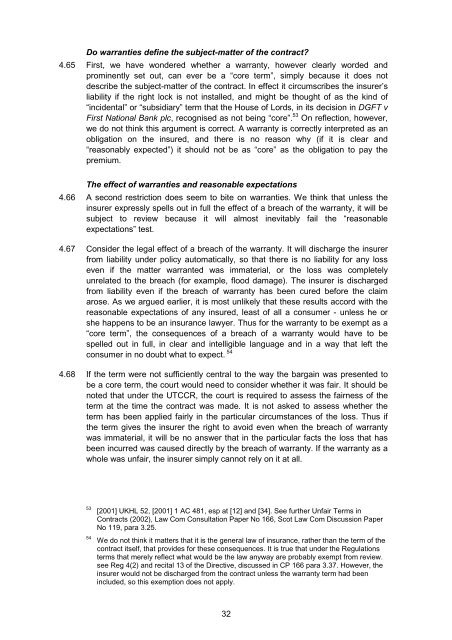Insurance Contract Law Issues Paper 2 Warranties - Law Commission
Insurance Contract Law Issues Paper 2 Warranties - Law Commission
Insurance Contract Law Issues Paper 2 Warranties - Law Commission
Create successful ePaper yourself
Turn your PDF publications into a flip-book with our unique Google optimized e-Paper software.
Do warranties define the subject-matter of the contract?<br />
4.65 First, we have wondered whether a warranty, however clearly worded and<br />
prominently set out, can ever be a “core term”, simply because it does not<br />
describe the subject-matter of the contract. In effect it circumscribes the insurer’s<br />
liability if the right lock is not installed, and might be thought of as the kind of<br />
“incidental” or “subsidiary” term that the House of Lords, in its decision in DGFT v<br />
First National Bank plc, recognised as not being “core”. 53 On reflection, however,<br />
we do not think this argument is correct. A warranty is correctly interpreted as an<br />
obligation on the insured, and there is no reason why (if it is clear and<br />
“reasonably expected”) it should not be as “core” as the obligation to pay the<br />
premium.<br />
The effect of warranties and reasonable expectations<br />
4.66 A second restriction does seem to bite on warranties. We think that unless the<br />
insurer expressly spells out in full the effect of a breach of the warranty, it will be<br />
subject to review because it will almost inevitably fail the “reasonable<br />
expectations” test.<br />
4.67 Consider the legal effect of a breach of the warranty. It will discharge the insurer<br />
from liability under policy automatically, so that there is no liability for any loss<br />
even if the matter warranted was immaterial, or the loss was completely<br />
unrelated to the breach (for example, flood damage). The insurer is discharged<br />
from liability even if the breach of warranty has been cured before the claim<br />
arose. As we argued earlier, it is most unlikely that these results accord with the<br />
reasonable expectations of any insured, least of all a consumer - unless he or<br />
she happens to be an insurance lawyer. Thus for the warranty to be exempt as a<br />
“core term”, the consequences of a breach of a warranty would have to be<br />
spelled out in full, in clear and intelligible language and in a way that left the<br />
consumer in no doubt what to expect. 54<br />
4.68 If the term were not sufficiently central to the way the bargain was presented to<br />
be a core term, the court would need to consider whether it was fair. It should be<br />
noted that under the UTCCR, the court is required to assess the fairness of the<br />
term at the time the contract was made. It is not asked to assess whether the<br />
term has been applied fairly in the particular circumstances of the loss. Thus if<br />
the term gives the insurer the right to avoid even when the breach of warranty<br />
was immaterial, it will be no answer that in the particular facts the loss that has<br />
been incurred was caused directly by the breach of warranty. If the warranty as a<br />
whole was unfair, the insurer simply cannot rely on it at all.<br />
53 [2001] UKHL 52, [2001] 1 AC 481, esp at [12] and [34]. See further Unfair Terms in<br />
<strong>Contract</strong>s (2002), <strong>Law</strong> Com Consultation <strong>Paper</strong> No 166, Scot <strong>Law</strong> Com Discussion <strong>Paper</strong><br />
No 119, para 3.25.<br />
54 We do not think it matters that it is the general law of insurance, rather than the term of the<br />
contract itself, that provides for these consequences. It is true that under the Regulations<br />
terms that merely reflect what would be the law anyway are probably exempt from review.<br />
see Reg 4(2) and recital 13 of the Directive, discussed in CP 166 para 3.37. However, the<br />
insurer would not be discharged from the contract unless the warranty term had been<br />
included, so this exemption does not apply.<br />
32

















